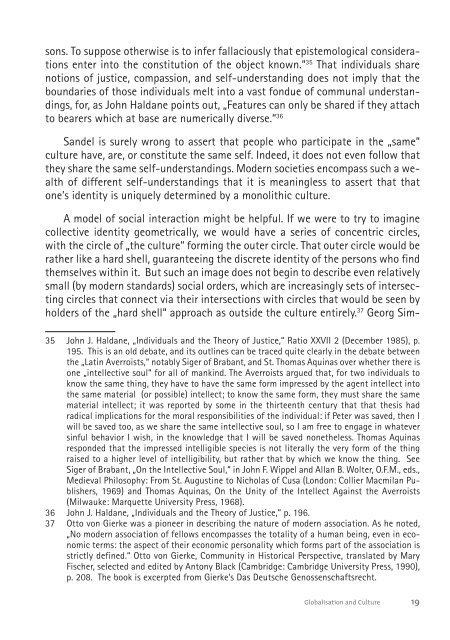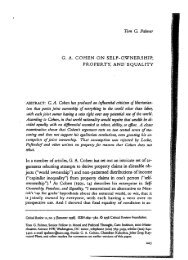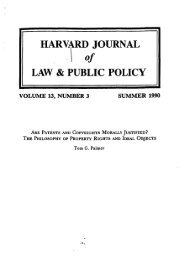Globalization and Culture - Tom G. Palmer
Globalization and Culture - Tom G. Palmer
Globalization and Culture - Tom G. Palmer
Create successful ePaper yourself
Turn your PDF publications into a flip-book with our unique Google optimized e-Paper software.
sons. To suppose otherwise is to infer fallaciously that epistemological considerations<br />
enter into the constitution of the object known.“ 35 That individuals share<br />
notions of justice, compassion, <strong>and</strong> self-underst<strong>and</strong>ing does not imply that the<br />
boundaries of those individuals melt into a vast fondue of communal underst<strong>and</strong>ings,<br />
for, as John Haldane points out, „Features can only be shared if they attach<br />
to bearers which at base are numerically diverse.“ 36<br />
S<strong>and</strong>el is surely wrong to assert that people who participate in the „same“<br />
culture have, are, or constitute the same self. Indeed, it does not even follow that<br />
they share the same self-underst<strong>and</strong>ings. Modern societies encompass such a wealth<br />
of different self-underst<strong>and</strong>ings that it is meaningless to assert that that<br />
one’s identity is uniquely determined by a monolithic culture.<br />
A model of social interaction might be helpful. If we were to try to imagine<br />
collective identity geometrically, we would have a series of concentric circles,<br />
with the circle of „the culture“ forming the outer circle. That outer circle would be<br />
rather like a hard shell, guaranteeing the discrete identity of the persons who find<br />
themselves within it. But such an image does not begin to describe even relatively<br />
small (by modern st<strong>and</strong>ards) social orders, which are increasingly sets of intersecting<br />
circles that connect via their intersections with circles that would be seen by<br />
holders of the „hard shell“ approach as outside the culture entirely. 37 Georg Sim-<br />
35 John J. Haldane, „Individuals <strong>and</strong> the Theory of Justice,“ Ratio XXVII 2 (December 1985), p.<br />
195. This is an old debate, <strong>and</strong> its outlines can be traced quite clearly in the debate between<br />
the „Latin Averroists,“ notably Siger of Brabant, <strong>and</strong> St. Thomas Aquinas over whether there is<br />
one „intellective soul“ for all of mankind. The Averroists argued that, for two individuals to<br />
know the same thing, they have to have the same form impressed by the agent intellect into<br />
the same material (or possible) intellect; to know the same form, they must share the same<br />
material intellect; it was reported by some in the thirteenth century that that thesis had<br />
radical implications for the moral responsibilities of the individual: if Peter was saved, then I<br />
will be saved too, as we share the same intellective soul, so I am free to engage in whatever<br />
sinful behavior I wish, in the knowledge that I will be saved nonetheless. Thomas Aquinas<br />
responded that the impressed intelligible species is not literally the very form of the thing<br />
raised to a higher level of intelligibility, but rather that by which we know the thing. See<br />
Siger of Brabant, „On the Intellective Soul,“ in John F. Wippel <strong>and</strong> Allan B. Wolter, O.F.M., eds.,<br />
Medieval Philosophy: From St. Augustine to Nicholas of Cusa (London: Collier Macmilan Publishers,<br />
1969) <strong>and</strong> Thomas Aquinas, On the Unity of the Intellect Against the Averroists<br />
(Milwauke: Marquette University Press, 1968).<br />
36 John J. Haldane, „Individuals <strong>and</strong> the Theory of Justice,“ p. 196.<br />
37 Otto von Gierke was a pioneer in describing the nature of modern association. As he noted,<br />
„No modern association of fellows encompasses the totality of a human being, even in economic<br />
terms: the aspect of their economic personality which forms part of the association is<br />
strictly defined.“ Otto von Gierke, Community in Historical Perspective, translated by Mary<br />
Fischer, selected <strong>and</strong> edited by Antony Black (Cambridge: Cambridge University Press, 1990),<br />
p. 208. The book is excerpted from Gierke’s Das Deutsche Genossenschaftsrecht.<br />
Globalisation <strong>and</strong> <strong>Culture</strong> 19











